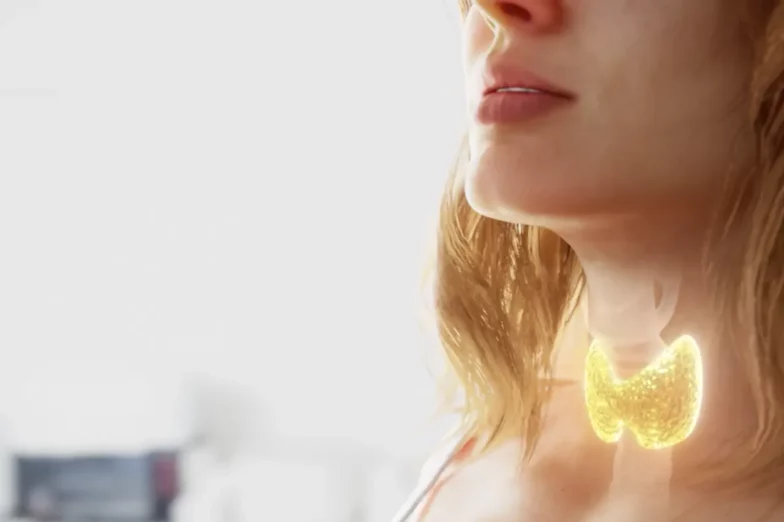Millions of adults in the US are living with hypothyroidism, a condition in which the thyroid gland – a small butterfly-shaped organ located in the neck – doesn’t produce enough of the hormones it normally should. These hormones help regulate our energy levels, our weight, core temperature, metabolism, and mood.
Many people who have an underactive thyroid are unaware that this condition even exists, however, or that it may be causing or contributing to their depression, fatigue, weight gain, infertility, or other serious symptoms. The American Thyroid Association has noted that a full half of those with hypothyroidism don’t know they have it.
It’s vital for integrative health care providers, and anyone interested in taking charge of their health, to educate themselves about this common condition and to understand the most comprehensive options for treating it.
What is hypothyroidism?
When the thyroid gland does not produce enough thyroid hormones, doctors describe the condition as hypothyroidism (the prefix hypo- means “too little”).
Many people experience what is called a subclinical type of hypothyroidism. This may manifest as low body temperature and depression, yet blood test values appear normal. A common cause of hypothyroidism today is an autoimmune condition known as Hashimoto’s disease (named for the Japanese physician who first described it in 1912). Hashimoto’s typically shows up between the ages of 30 and 50 years old, afflicting women 7 times more commonly than men. This form of hypothyroidism is believed to be due to a combination of genetic and environmental factors, and like many autoimmune diseases is associated with food allergies to gluten.
Those environmental factors are quite prevalent in the industrialized world, unfortunately.
Endocrine-disrupting chemicals that interfere with the thyroid’s function are commonly found in packaged food, municipally-treated water, and personal care products. Microplastics, pesticides, and heavy metals all damage the endocrine system and can lead to gut bacteria imbalances and autoimmune conditions.
Lack of iodine and other nutritional deficiencies can also cause hypothyroidism, since iodine and other nutrients are necessary for proper thyroid function.
Other causes of hypothyroidism include the following:
- Disorders of the pituitary or hypothalamus (the thyroid is part of the broader hypothalamic-pituitary-adrenal-thyroid axis, the major neuroendocrine system that responds to stress.)
- Radiation to the neck or head
- Drugs such as interferon-a and lithium
- Certain newer classes of cancer medications
- Congenital hypothyroidism, where part or all of the thyroid gland is missing at birth (newborns are tested for this condition at hospitals).
Although the causes are varied, the symptoms of hypothyroid are consistent and may include the following:
- Feeling cold
- Having low energy or feeling tired
- Depression
- Brain fog
- Weight gain
- Thinning hair
- Constipation
- Muscle weakness
- Muscle aches, tenderness, and stiffness
- Joint pain or swelling
- Enlarged thyroid gland (also called a goiter)
- Infertility
Symptoms of hypothyroidism will vary from person to person, and don’t always correlate directly with how low the gland’s hormone production is. Yet as the condition becomes more serious, new symptoms can emerge or become more noticeable.
The Limits of Conventional Treatment for Hypothyroidism
A blood test can show if the levels of the thyroid hormone known as T4 are abnormally low. I recommend additional monitoring to my patients that allows us to discern potential thyroid issues, before conventional blood tests can. Most conventional tests only check for T3 and TSH, but a comprehensive integrative mental health analysis should include Thyroid-Stimulating Hormone (TSH) –
Total Thyroxine (T4) , Free Thyroxine (T4), Free Triiodothyronine (T3) Reverse T3, Thyroglobulin antibody (ATA) and Thyroid Peroxidase antibody (TPO).
A form of synthetic T4 is the main conventional treatment for hypothyroidism and is typically prescribed once someone is diagnosed by their health care provider. After the ingestion of the synthetic hormone, the body responds as if it were producing thyroid hormones itself. However, there are also natural thyroid hormones like Armour thyroid, which combines T3 and T4 and which is often a preferred treatment.
Even with hormone treatment, conditions associated with hypothyroidism – such as the presence of harmful chemicals, the effects of long-term stress, and potential vitamin deficiencies – need to be addressed if optimal health is to be regained.
How can Hypothyroidism be treated naturally?
While many physicians are trained to simply write prescriptions for their patients, high levels of stress, micronutrient deficiencies, and various foods and substances can all negatively impact the thyroid gland, even when synthetic hormone treatment is helping to manage symptoms.
Natural treatments are vital to restore true health. They include: learning how to reduce stress, limiting your exposure to toxins, restoring the gut microbiome, eating a healthy diet, and supplementing with nutrients wherever deficiencies exist.
Dietary Approaches
Our diet has a level of impact on our health that just can’t be overstated. Our thyroid function is no exception. What we eat can either support or stress our thyroid gland and our body as a whole.
Foods to Add
Foods that support the thyroid’s natural functioning include seaweed, which is rich in iodine.
I recommend my clients experiment with eating either nori or seaweed salad 3 to 4 times per week. If you don’t like the taste or texture, adding powdered kelp to a smoothie is a great alternative.
Polyphenols are another powerful support for thyroid health, lowering the concentration of antibodies that attack the thyroid gland in cases of Hashimoto’s.
Many fruits and vegetables contain polyphenols, including berries, cherries, citrus fruits, artichokes, and spinach.
Green tea and dark chocolate are two other tasty sources of polyphenols to include in your diet.
Foods to Avoid
Many processed foods are packaged in plastic, a neuroendocrine disruptor. A diet focused on fresh, whole foods is always safer as well as more nourishing.
However, fresh foods that are grown with chemical fertilizers or pesticides can also contain compounds that affect our hormonal balance. This is one reason I recommend limiting your consumption of meat and dairy – where chemical additives accumulate in higher concentration – to certified organic varieties where possible.
Avoiding inflammatory foods can help the thyroid gland and whole-body health. These foods include:
- Deep-fried foods
- Processed meats
- Breads and pastas made with white flour
- Commercially baked goods
- Candy and all foods containing added sugar
- Beverages sweetened with sugar, including soda and sports drinks
In addition, goitrogenic foods negatively impact thyroid function, including:
- Soy products
- Broccoli, cauliflower, kale and cabbage (and all cruciferous vegetables)
- Cassava
- Lima beans
While it is not necessary to eliminate cruciferous vegetables entirely, it’s recommended to eat them in moderation, preferably lightly steamed.
Avoiding inflammatory, packaged, processed, and non-organic foods is also very beneficial for those struggling with low thyroid function.
Nutrients and Supplements to Consider
Autoimmune diseases, including Hashimoto’s, can lead to malabsorption of some vitamins.
Supplements such as Vitamin B-12, Zinc and Selenium (which facilitates the conversion of related thyroid hormones into the active form, T3) can support thyroid function. Tyrosine, magnesium, and vitamins B2, B3, B6, C, E, and D also play a part in the production of thyroid hormones. I recommend a full panel of tests to all my clients to determine their levels of vitamins or nutrients.
Certain probiotics can increase the gut’s ability to absorb nutrients in cases where the microbiome is compromised or imbalanced.
In addition, desiccated pig or cow thyroid is a natural alternative to the synthetic hormone that mainstream physicians prescribe to treat low thyroid. The extract contains the same hormones as our own thyroid, and many individuals diagnosed with hypothyroidism prefer it.
A 2013 study published in The Journal of Clinical Endocrinology & Metabolism compared one group of participants that received the natural extract against another group receiving the synthetic hormone levothyroxine.
The study’s results indicated that the natural extract balanced the thyroid gland just as well as the synthetic one, while also being associated with greater weight loss.
Lifestyle Modifications
Long-term stress alters our physical functions – up to and including the functioning of the brain. Experiencing significant stress or trauma impairs the strength and balance of our HPAT axis — the neuroendocrine “circuitry” connecting the hypothalamus, pituitary, adrenal, and thyroid glands.
One of the most powerful ways to help restore balance to our HPAT axis and thyroid is regular exercise.
As I tell my clients, the best form of exercise is the one you will actually do. There are several categories of exercise; you can pick and choose among them:
- Aerobic exercise includes walking, running, swimming, or using a treadmill or rowing machine.
- Anaerobic exercise includes weight lifting, resistance training, and strength training exercises, along with high intensity interval training and core exercises like pilates.
- Stretching can be combined with core work or balance and coordination exercises, as in yoga.
- Energetics exercises include chi gong, tai chi and yoga.
- Special exercises such as martial arts represent a combination of exercises that may combine aerobic, anaerobic and energetics.
I recommend taking time before starting a new exercise routine to reflect on your history with exercise and movement, including what it has or has not meant to you, and what it can mean for your health right now.
This can help you align with your goals, marshall your motivation, and ensure you adhere to your exercise plan.
Herbal and Alternative Therapies
Research suggests that some herbal supplements and alternative therapies can boost thyroid function. (Remember to keep your unique health condition in mind and consult with a trusted health care provider before making major changes.)
One potent herb for thyroid is ashwagandha, an adaptogen frequently used in Ayurvedic medicine which studies have shown can help normalize low thyroid function in the range of 600 mg doses. As an adaptogen, it helps us to adapt to stress. For those with hypothyroidism, cooking with anti-inflammatory herbs such as ginger, garlic, and turmeric is supportive as well.
Acupuncture shows promise as a means of boosting thyroid hormones, while yoga poses such as shoulder stand, fish pose, cobra, camel, and legs-up-the-wall all provide gentle stimulation to the gland as well as promoting stress relief.
Is Hypothyroidism curable?
Many mainstream physicians believe hypothyroidism can not be cured and patients must remain on synthetic hormones for the rest of their life.
But my own experience as an integrative healthcare provider suggests it depends on what is causing the condition.
For some, a health care regimen which includes supplementation with iodine and seaweed, targeted yoga, and a reduction of inflammatory foods can balance thyroid function.
If you have or believe you may have hypothyroidism, it’s important to find and work with a reputable health care provider with training in functional or naturopathic medicine, nutrition, or herbal medicine who can help you accurately assess and treat your condition.
Conclusion
Many factors – including genetics, environmental stressors, toxins, and diet – can contribute to the development of hypothyroidism or subclinical hypothyroidism.
To treat the condition most effectively, a multilayered approach is best, including:
- A comprehensive test of thyroid hormone levels along with a full panel of vitamin and nutrient tests to check for deficiencies.
- Treatment with a hormone replacement such as Armour thyroid, if indicated
- Stress management to balance the thyroid and broader neuroendocrine system.
- Exercise to help with managing stress and supports the thyroid and overall physical functioning of the body.
- Minimizing exposure to toxins in personal care products along with sticking to a healthy diet that incorporates whole foods and minimizes inflammatory food products.
- Supplementation with nutrients and herbs, which can help restore the body’s balance and further contribute to symptom reduction.
Reputable health care providers trained in functional or naturopathic medicine, nutrition, or herbal medicine can help accurately assess and treat hypothyroidism.
- Touch Therapy for Trauma Recovery - April 19, 2024
- The Soul of Basil - March 12, 2024
- A Comprehensive Guide to Natural Hypothyroidism Treatment - November 17, 2023

Are You Ready to Advance Your Career?
If you want to advance your career in integrative medicine, explore my courses and certifications.












